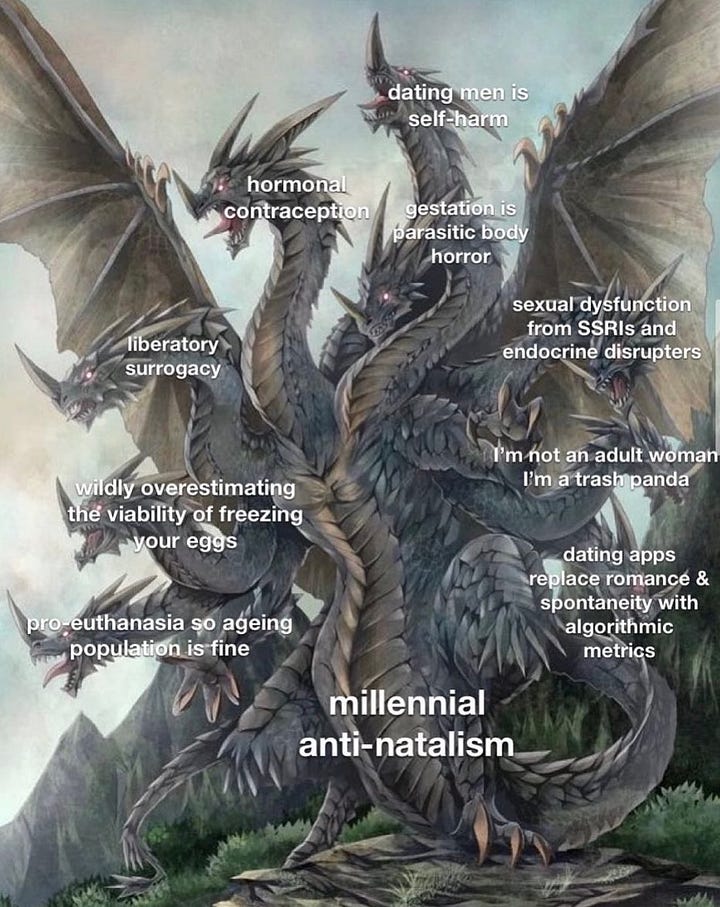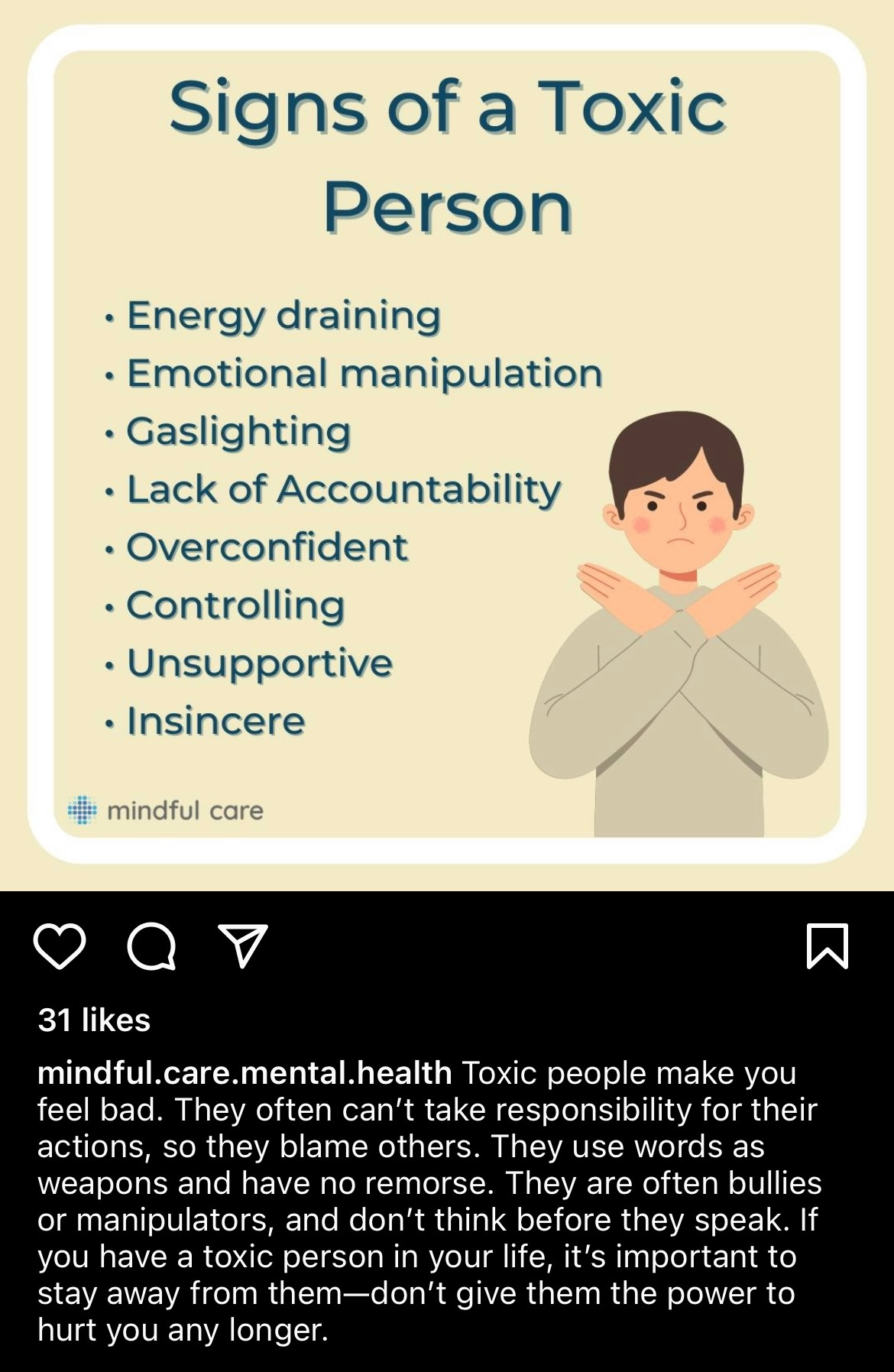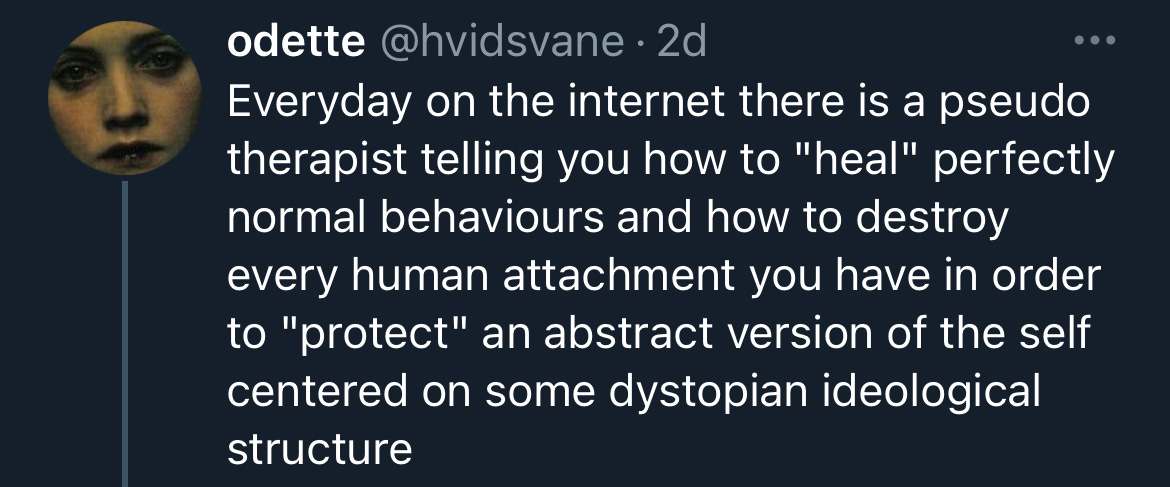how did you realise you were a bad person?
Instagram therapy, fascist girbloggers, SSRI panic and doing good
‘How did you realise you were a bad person, and when did you decide to change?’, was a question I saw floating around on Twitter the other day. It appeared to labour over the assumption that any of the potential readers were indeed bad people, that they would at least be able to recognise that in themselves, or that anyone is in fact a ‘bad person’ to their core. I’m not sure I believe it myself. Not for the most part, anyway. Evil acts exist, and so does evil ideology, but for most people, the descriptor of ‘bad person,’ or in more common internet parlance, ‘toxic’ or ‘narcissist,’ is such an unsympathetic and all-encompassing categorisation which gives a poor prognosis for any sort of transformation. If someone really was a bad or toxic person, instead of just doing bad or toxic things, would they have the capacity to change in the first place? And should they have access to the much-needed interpersonal support to transform their life? The psychologists practising at Instagram University Hospital don’t seem to think so.
I have never had a therapist who speaks anything like the ones online. I have never heard any of my former therapists talking about ‘being at capacity’ and ‘cutting people off who don’t serve you.’ On the contrary, the one who changed my life held me to account, kindly but firmly. The goal for my therapy back when I was 19 was to be comfortable being vulnerable with people, and to express grievance instead of bottling it up and cultivating resentment. One session, I was telling her about how I felt like my friends all secretly hated me. I was expecting a response which would once again walk me through the classic CBT cycle of exploring thoughts-feelings-behaviour. Instead, all she said was:
‘Isn’t that a cruel way of thinking about your friends?’
‘Pardon?’ I said. Nowhere in any of these scenarios was I the one in the wrong.
‘Isn’t it more kind to give them the benefit of the doubt that they actually like you? Is that how you feel about your friends? Do you secretly hate them?’
I shook my head.
‘You seem to be letting your critical inner voice bully your loved ones, too. You’ve got such high standards for yourself that you believe you’re the only one who can possibly meet them. Be kinder to yourself, but also to the people around you.’
Even this was a far more generous takedown than I deserved. I was - and still am, in many ways - a terrible and very absent friend. My fear of rejection and lack of object permanence selfishly stops me from touching base with people I really should stay in contact with. I was expecting constant positive reassurance and feedback from people which I didn’t reciprocate, and I thought that a lack of communication was better than communication with a negative outcome. In reality, it is not. It is lonely. I won’t pretend I’ve resolved all of these issues, but I’m more at peace with them now.
Much of the discourse on bad therapy responds to a largely online and consumerist model which centres the individual, popularised by barely qualified quacks looking to make a quick buck through BetterHelp and Instagram infographics. At the core of it seems to be a belief that you - the patient, the self-healer, the consumer - are not the problem, and everyone else is toxic, or a narcissist, or an abuser. You are just vibrating at a higher frequency than they are. Everyone is out to get you. Crucially, the customer is always right. It is like nothing I have ever experienced through the NHS, as underfunded and ineffective as their services can be, and I wonder if it is mostly a product of the free market deregulation of healthcare seen in the US which is creeping into the UK mental health landscape: instead of resourcing and funding psychiatric treatment or improving material conditions, we are increasingly subject to empty campaigning such as Time To Talk and Heads Together, the initiative launched by none other than the Royal Family themselves. Waiting lists are so long and costs so high that people have to access cheap solutions from therapists with questionable credentials on unregulated apps like BetterHelp if they want any at all. It is unsurprising that people are turning to social media out of desperation for an alternative, and uncritically churning out everything they read in the process.
The so-called ‘HR-ification’ of interpersonal relations – an appropriate term, given the particularly capitalist bent of its aetiology – involves Insta-therapists encouraging the use of social scripts full of meaningless jargon, such as the much maligned template above, to ‘protect your peace’ and ‘assert your boundaries’ against those aforementioned narcissists and abusers in your life. Needless to say, it impedes genuine communication and makes it feel stilted and sterile, and refusing to engage with anything that ‘doesn’t serve you’ is unrealistic and selfish. However, aside from people using therapy speak for blatantly manipulative ends (see: Jonah Hill’s texts to his ex, which had nothing to do with boundaries being crossed and everything to do with coercion and control), I’m not convinced it’s a problem which merits huge intervention beyond an eye-roll or a throwaway comment. If someone is being self-centred and talking in annoying and ultimately meaningless stock phrases, no one is putting a gun to your head and forcing you to engage with them! Talk to them about how difficult you find their communication style, or choose better friends who annoy you less and behave in a way you find more genuine! Stilted and sterile conversations are a shame, and people cutting you off for minor mistakes in order to protect their peace is sad, but equally, you cannot force them to interact with you on your terms. You cannot force someone to act in a way you think is more authentic or human, or to accept your imperfect interpersonal behaviour as a messy and natural and essential part of life.
There has been some acknowledgment of this phenomenon of therapy-speak permeating everyday conversations, but is it really so widespread that it is worth extensive commentary? A recent article by Eleanor Morgan for the Guardian mentions how secondary school children are using words like ‘triggered,’ ‘gaslighting’ and ‘toxic’ in the classroom. As a teacher myself, this has been my experience on a few occasions too, but I don’t think it is necessarily problematic. Children are proficient mimickers, and incorporate internet language into their repertoire of vocabulary with ease. The moral panic about children identifying as cats, moons, and even holograms, stoked by education grifters like Katharine Birbalsingh, is a great example: kids are brilliant at doing extended bits farmed from internet culture which adults would never understand. Personally, I’m glad they have language to express feelings that I wouldn’t have been able to articulate at that age, and either way, language and meaning always changes and evolves. However, the reaction to the uptick of instances of ‘therapication’ in offline contexts has also given rise to some dangerous cynicism about psychological conditions which can and do severely affect people’s everyday lives: everyone is diagnosed with something; SSRI medication does more harm than good; we are pathologising normal human behaviours. But what is normal?
This increasingly common overcorrection has more sinister implications, I think, than many people realise. Making appeals to a true human nature which is raw and emotional and animalistic, and better like this than in an altered, ‘therapised’ state, is as dangerous as it is untrue. Some people, especially those who are autistic, do have a flat emotional affect, do rely on scripts and do have a clear-cut sense of justice which leads them to cut off those who transgress it. When we talk about these traits as inhuman and robotic, what are we implying about the people who display them? The impulse to be unapologetic about emotional outbursts and unpalatable conduct as simply a fact of basic human nature is also just as individualistic as the HR-ified approach to relationships that is in the firing line: sometimes our emotional expression does hurt the people around us, and it would be better if we could take the responsibility to compartmentalise it until we can open up in a less hurtful way. Online ‘therapy influencers’ attempt to teach emotion management a priori - to feel our feelings in a measured and professional way before the event of an emotional outburst, just in case it harms us, just in case it ruins our life, just in case, and god forbid, someone takes advantage of our lack of boundaries, or worse still, we become the abusers which caused us this psychic damage in the first place. There is no evidence any of this will happen, save for the memories of our own traumatic experiences which tint our view and make us cautious of repeating similar patterns, and I think a lot of therapy content capitalises on and feeds off this. It is not conducive to healing yourself or your relationships. It is only conducive to a life wrapped in a protective film, in fear of your own feelings and the messy realities of how we treat each other, and an outlook where you spend most of your time gazing at your own navel instead of outwards at the people around you. However, the counter-narrative emerging from all of this does not always seem to involve a kind reminder that everyone fucks up while offering a firm encouragement to reflect and do better - instead, the overcorrection spills almost into apologia for harmful behaviour because it is fundamentally human and real and natural.
I am also not convinced that some of this reactionary backlash to therapy and ‘pathologising normal behaviours’ is unrelated to the SSRI panic currently being pedalled by the fascist right. A few weeks back, a video of a nineteen year old mother preparing dinner for her two children, captioned ‘Sometimes nothing hits better than some zogslop’ went viral on Twitter. Antisemitic dogwhistle very much held in mind for later,1 a number of the comments referred to her ‘SSRI eyes,’ ’thousand yard stare,’ and how SSRIs are the equivalent of a ‘modern lobotomy,’ which is ironic, considering a lobotomised adolescent housewife is arguably the sort of woman the alt-right would salivate over. Of course, this is the extreme end of the spectrum, and there is a separate conversation to be had about the use of SSRIs as a plaster over the gaping wound caused by late capitalism. But the RETVRN TO TRADITION crowd, whose main public enemies include the Jews pumping chemicals into our water supply and girlbosses running on Zoloft and dead viable foetuses, occasionally sound not all that dissimilar to the drips and drabs of young and mostly female internet users dabbling in anti-therapy/SSRI rhetoric. And that is where it becomes a problem.
Many of these women are also turning towards a mistrust in scientific method, psychiatric help and modernity writ large, and are enticed into more, ahem, antiquated modes of living. The online Tradcath community is a small but irritatingly vocal contingent of the internet, which currently seems to be enjoying peak recruitment among young, usually mentally ill, once-upon-a-time ostensibly ‘left-leaning’ women, including the Red Scare Podcast’s Dasha Nekrasova - the very demographic you probably wouldn’t expect. My conviction that the Catholic Church is a net negative for humanity was simply reinforced further once I found out that Nekrasova, known mean girl, friend of Alex Jones and prolific user of ableist slurs, had decided that Sedevacantism was her calling. Many of the original members are outright fascists, and the ones joining are quickly getting up to speed on the cultural signifiers and dogwhistles required to fit in. However, I am convinced that most of them are drawn to Catholicism not out of a deep desire to do better but to simply spend hours of their time LARPing for the aesthetic, moping about self-sacrifice, guilt and repentance, while aligning themselves with some of the worst and most harmful beliefs espoused by people who act in the worst and most harmful ways. Maybe I’m approaching this from a Jewish-inflected secular angle and could never truly understand, but isn’t doing good the whole point? I am not qualified whatsoever to comment on Jewish theology, and would never deny the deep importance in Judaism of intellectual engagement with scripture and philosophy. But the doing, the active trying, is essential. Hillel the Elder once said that the Golden Rule ‘is the whole Torah; the rest is the explanation.’ The whole point of Teshuva for sins against others is not simply asking God for forgiveness - the first step is confession, but what is he going to do about it? - you have to make amends to those you have hurt, feel genuine regret, and commit to doing better. If they can’t bring themselves to feel remorse for dabbling in a bit of fascism and saying the word ‘retarded’, then maybe these new Trad girlies would be kinder if they had some Instagram therapy. They’d probably be less insufferable.
Virtuous Dasha acting just as Jesus intended
You could level my own argument at me that all of this is inconsequential outside of a tiny corner of the internet, so why bother engaging with it or even thinking about it at all, and I would largely agree. But to me it seems so obvious that this is part of a wider framework of creeping fascism, which only helps the rightward shift of the Overton window feel more normal and omnipresent. An investment in these communities with these sorts of beliefs is an automatic contribution to a messy network of conspiracies and dogwhistles that go far deeper than buying into an aesthetic attraction to tradition, nature and beauty. Let’s bring the reference to ‘Zogslop’ back to the fore for a second, and sit with the idea of the Zionist Organised Government infecting our food and water supply with chemicals and hormones. This works to undermine trust in public health, and the rallying cry of ‘retvrn to tradition’ is a way of circumventing the supposed interference by malicious actors. It applies to anything from nutrition, leading to an apparent increase in popularity of quack diets which claim to mimic ‘natural’ human consumption, such as Jordan Peterson’s raw meat regimen, seed oil exclusion and Ray Peat hormone hacking, to medical intervention, where we find our resistance especially to SSRIs and hormonal contraceptives. It is no coincidence that these are two medications that women take disproportionately. The effect of contraception and SSRIs on the nuclear family, the fertility rate and the patriarchal order is a disaster for fascists - this we already know. But it also extends upwards, to the ongoing trans panic and fear of ‘mutilating and corrupting children,’ QAnon and The Great Replacement, and plunges downwards, into its roots of blood libel, the fourteen words,2 and the Protocols of the Elders of Zion. It is antisemitic to its core. To see people engaging with it, even in a semi-ironic wink-wink-nudge-nudge fashion via Instagram meme accounts which give them plausible deniability, has been physically revolting.




On a more personal level, this creeping reactionary tendency against psychological intervention is starting to get to me. Good therapy and SSRIs have saved my life on two occasions now, and I am unable to function without them due to the severe bouts of OCD which arise when I am unmedicated. Of course, it’s none of my business if this is the specific hill you want to die on but in an ostensibly progressive way, because you want to stick it to big pharma or leave your body au naturel like God intended - you’re definitely not a useful idiot for the growing number of people who think they understand polyunsaturated fats and free radicals, or believe drinking their own fermented piss cures cancer. Being acutely aware of the downsides of SSRIs, such as rapid weight gain, sexual dysfunction, emotional numbing, and gnarly withdrawal symptoms, is one thing. That said, I’d take all of it over being dead.
Ultimately, do you have to intellectualise your vulnerabilities and your redemption narrative to a point that it serves you and you alone? Do you have to sound so certain about the nature of the soul or the essence of human experience to comfort yourself over your failings and grievances? One of the things I tried to instil in the children I taught last year is that it is so easy to be kind, and much harder and more labour-intensive to be mean. If you have to spend so much time and energy thinking about being good or kind or natural or human, you are not using that time to instinctively do good. That isn’t to say that you are bad - just that you could be better.
*ZOG - a white nationalist acronym meaning Zionist Occupied Government. ‘Zogslop/goyslop’ refers to the idea that the US government, infiltrated and subverted by globalist Jews, pumps harmful chemicals into the food eaten by poor unsuspecting white goyim.
‘We must secure the existence of our people and a future for our white children.’










I think one of the most persistent and intractable problems with online discourses is that social media *structurally* takes the dialectical nature of discourse itself and massively amplifies it. Every correction becomes an overcorrection and discourse swings from one wild extreme to the other, so the "correction" to 2000s raunch culture was tenderqueers, and the "correction" to tenderqueer puritanism is Paglian gibberish and tradshit, and god knows what will "correct" that, and in every one of these wild cultural swings there is an opportunity for authoritarians and reactionaries to capitalize on people's genuine grievances and redirect them towards ideologies inimical to human freedom and self-expression. At this point I am not sure if anything actually good can come from the internet as we know it, it's a virtual prison yard with all the unhealthy social dynamics associated with such. However with the technologically mediated enclosure of every aspect of human sociality it is hard to even imagine an alternative.
okay thank you for bringing up the weird leftist anti-therapyspeak overcorrection... shit makes my eye twitch